Deepwater Horizon: Control and Response Analysis in Project Mgmt
VerifiedAdded on 2023/06/08
|5
|1079
|161
Case Study
AI Summary
This case study examines the Deepwater Horizon oil spill through the lens of 'control and fast response,' a project management approach crucial for complex projects. It highlights the negligence in the Deepwater Horizon incident, particularly the flawed cement base and the engineers' failure to report the issue. The paper emphasizes the significance of organizational mindfulness, incorporating security, system refinement, and innovation to mitigate uncertainties. It contrasts traditional project management with the control and response approach, which acknowledges influential factors that can disrupt progress. Applying control and response, along with mindfulness, could have helped generate knowledge and policies to prevent deviations and enable individuals to take necessary actions during emergencies, potentially averting the Deepwater Horizon disaster. The analysis concludes that implementing control and response could have improved the overall operation by fostering mindfulness and proactive problem-solving.
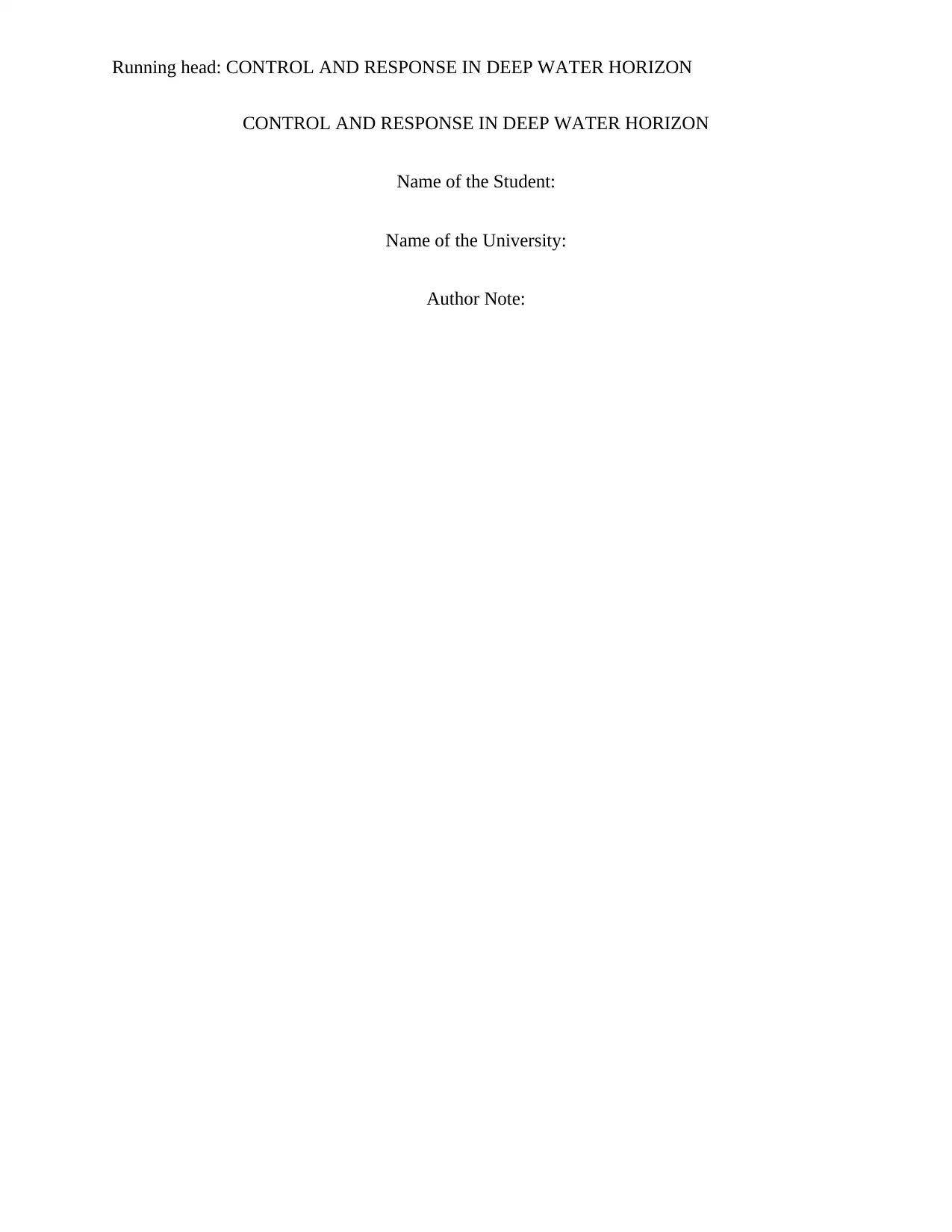
Running head: CONTROL AND RESPONSE IN DEEP WATER HORIZON
CONTROL AND RESPONSE IN DEEP WATER HORIZON
Name of the Student:
Name of the University:
Author Note:
CONTROL AND RESPONSE IN DEEP WATER HORIZON
Name of the Student:
Name of the University:
Author Note:
Paraphrase This Document
Need a fresh take? Get an instant paraphrase of this document with our AI Paraphraser
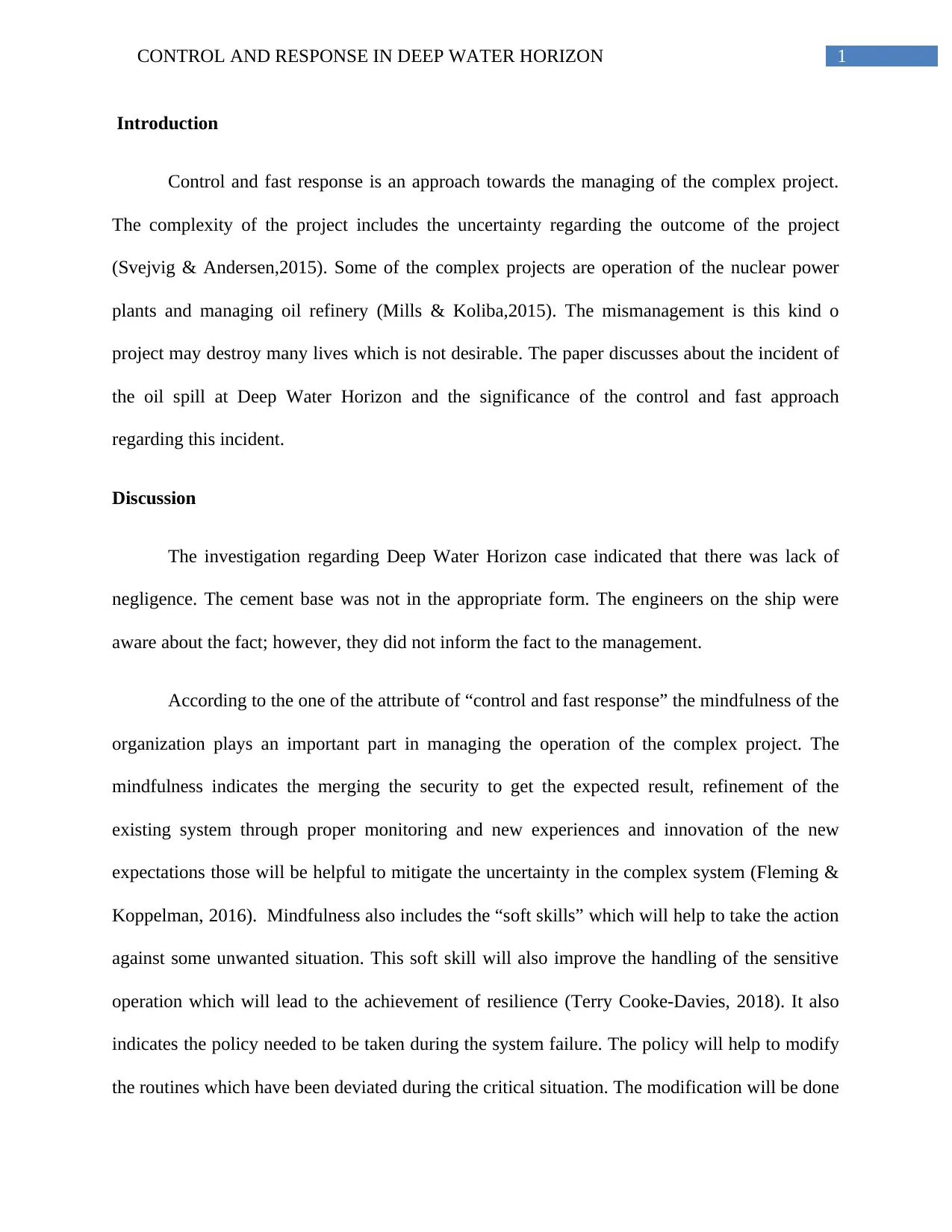
1CONTROL AND RESPONSE IN DEEP WATER HORIZON
Introduction
Control and fast response is an approach towards the managing of the complex project.
The complexity of the project includes the uncertainty regarding the outcome of the project
(Svejvig & Andersen,2015). Some of the complex projects are operation of the nuclear power
plants and managing oil refinery (Mills & Koliba,2015). The mismanagement is this kind o
project may destroy many lives which is not desirable. The paper discusses about the incident of
the oil spill at Deep Water Horizon and the significance of the control and fast approach
regarding this incident.
Discussion
The investigation regarding Deep Water Horizon case indicated that there was lack of
negligence. The cement base was not in the appropriate form. The engineers on the ship were
aware about the fact; however, they did not inform the fact to the management.
According to the one of the attribute of “control and fast response” the mindfulness of the
organization plays an important part in managing the operation of the complex project. The
mindfulness indicates the merging the security to get the expected result, refinement of the
existing system through proper monitoring and new experiences and innovation of the new
expectations those will be helpful to mitigate the uncertainty in the complex system (Fleming &
Koppelman, 2016). Mindfulness also includes the “soft skills” which will help to take the action
against some unwanted situation. This soft skill will also improve the handling of the sensitive
operation which will lead to the achievement of resilience (Terry Cooke-Davies, 2018). It also
indicates the policy needed to be taken during the system failure. The policy will help to modify
the routines which have been deviated during the critical situation. The modification will be done
Introduction
Control and fast response is an approach towards the managing of the complex project.
The complexity of the project includes the uncertainty regarding the outcome of the project
(Svejvig & Andersen,2015). Some of the complex projects are operation of the nuclear power
plants and managing oil refinery (Mills & Koliba,2015). The mismanagement is this kind o
project may destroy many lives which is not desirable. The paper discusses about the incident of
the oil spill at Deep Water Horizon and the significance of the control and fast approach
regarding this incident.
Discussion
The investigation regarding Deep Water Horizon case indicated that there was lack of
negligence. The cement base was not in the appropriate form. The engineers on the ship were
aware about the fact; however, they did not inform the fact to the management.
According to the one of the attribute of “control and fast response” the mindfulness of the
organization plays an important part in managing the operation of the complex project. The
mindfulness indicates the merging the security to get the expected result, refinement of the
existing system through proper monitoring and new experiences and innovation of the new
expectations those will be helpful to mitigate the uncertainty in the complex system (Fleming &
Koppelman, 2016). Mindfulness also includes the “soft skills” which will help to take the action
against some unwanted situation. This soft skill will also improve the handling of the sensitive
operation which will lead to the achievement of resilience (Terry Cooke-Davies, 2018). It also
indicates the policy needed to be taken during the system failure. The policy will help to modify
the routines which have been deviated during the critical situation. The modification will be done
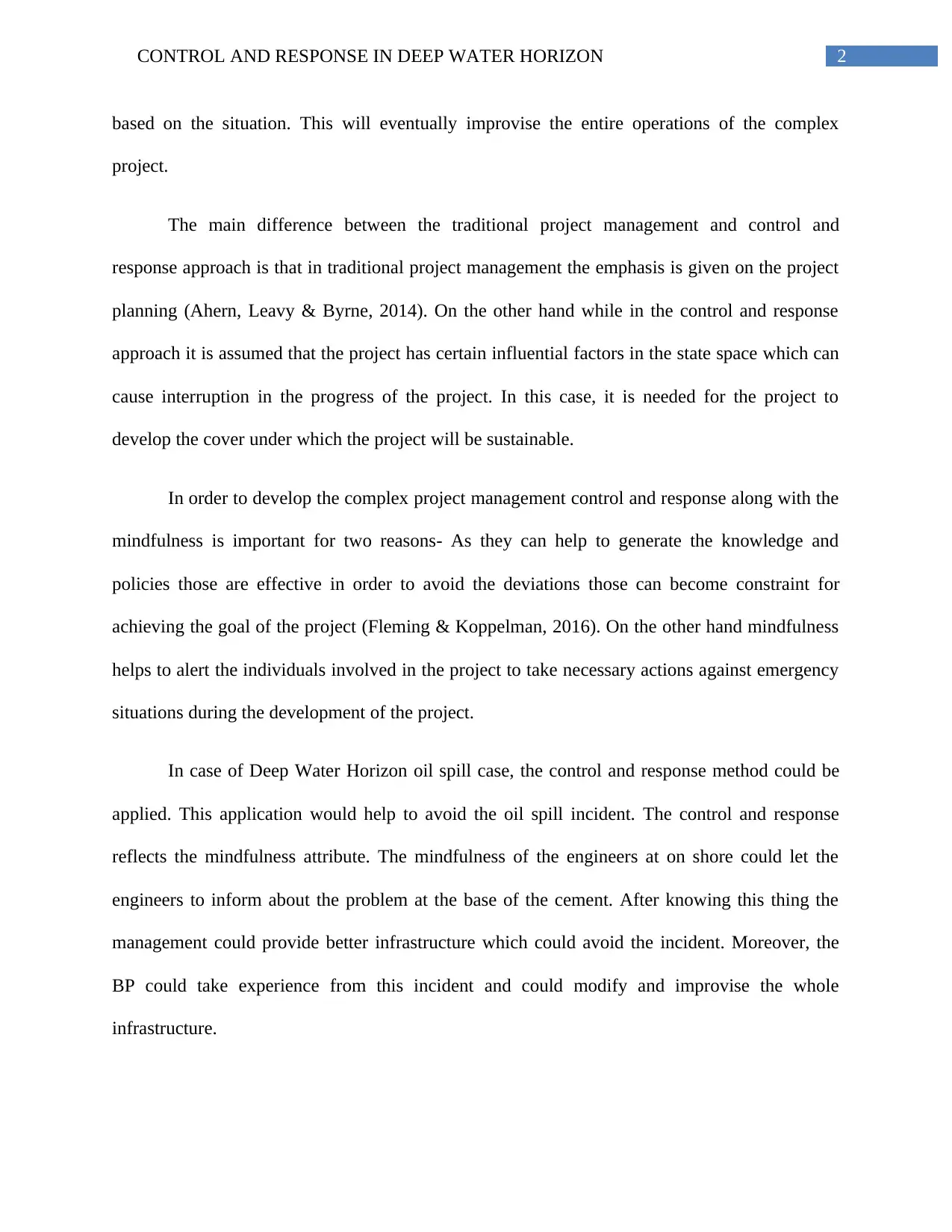
2CONTROL AND RESPONSE IN DEEP WATER HORIZON
based on the situation. This will eventually improvise the entire operations of the complex
project.
The main difference between the traditional project management and control and
response approach is that in traditional project management the emphasis is given on the project
planning (Ahern, Leavy & Byrne, 2014). On the other hand while in the control and response
approach it is assumed that the project has certain influential factors in the state space which can
cause interruption in the progress of the project. In this case, it is needed for the project to
develop the cover under which the project will be sustainable.
In order to develop the complex project management control and response along with the
mindfulness is important for two reasons- As they can help to generate the knowledge and
policies those are effective in order to avoid the deviations those can become constraint for
achieving the goal of the project (Fleming & Koppelman, 2016). On the other hand mindfulness
helps to alert the individuals involved in the project to take necessary actions against emergency
situations during the development of the project.
In case of Deep Water Horizon oil spill case, the control and response method could be
applied. This application would help to avoid the oil spill incident. The control and response
reflects the mindfulness attribute. The mindfulness of the engineers at on shore could let the
engineers to inform about the problem at the base of the cement. After knowing this thing the
management could provide better infrastructure which could avoid the incident. Moreover, the
BP could take experience from this incident and could modify and improvise the whole
infrastructure.
based on the situation. This will eventually improvise the entire operations of the complex
project.
The main difference between the traditional project management and control and
response approach is that in traditional project management the emphasis is given on the project
planning (Ahern, Leavy & Byrne, 2014). On the other hand while in the control and response
approach it is assumed that the project has certain influential factors in the state space which can
cause interruption in the progress of the project. In this case, it is needed for the project to
develop the cover under which the project will be sustainable.
In order to develop the complex project management control and response along with the
mindfulness is important for two reasons- As they can help to generate the knowledge and
policies those are effective in order to avoid the deviations those can become constraint for
achieving the goal of the project (Fleming & Koppelman, 2016). On the other hand mindfulness
helps to alert the individuals involved in the project to take necessary actions against emergency
situations during the development of the project.
In case of Deep Water Horizon oil spill case, the control and response method could be
applied. This application would help to avoid the oil spill incident. The control and response
reflects the mindfulness attribute. The mindfulness of the engineers at on shore could let the
engineers to inform about the problem at the base of the cement. After knowing this thing the
management could provide better infrastructure which could avoid the incident. Moreover, the
BP could take experience from this incident and could modify and improvise the whole
infrastructure.
⊘ This is a preview!⊘
Do you want full access?
Subscribe today to unlock all pages.

Trusted by 1+ million students worldwide
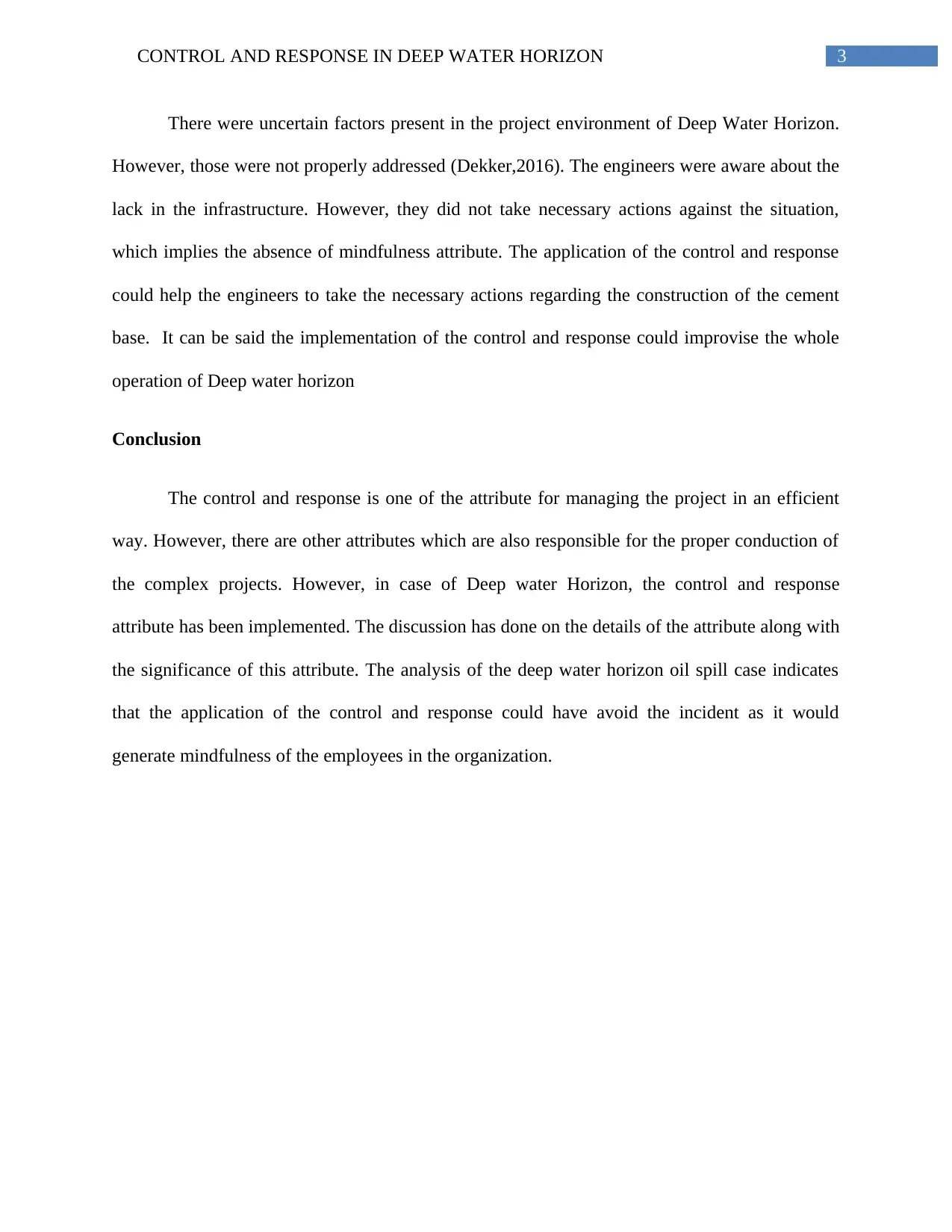
3CONTROL AND RESPONSE IN DEEP WATER HORIZON
There were uncertain factors present in the project environment of Deep Water Horizon.
However, those were not properly addressed (Dekker,2016). The engineers were aware about the
lack in the infrastructure. However, they did not take necessary actions against the situation,
which implies the absence of mindfulness attribute. The application of the control and response
could help the engineers to take the necessary actions regarding the construction of the cement
base. It can be said the implementation of the control and response could improvise the whole
operation of Deep water horizon
Conclusion
The control and response is one of the attribute for managing the project in an efficient
way. However, there are other attributes which are also responsible for the proper conduction of
the complex projects. However, in case of Deep water Horizon, the control and response
attribute has been implemented. The discussion has done on the details of the attribute along with
the significance of this attribute. The analysis of the deep water horizon oil spill case indicates
that the application of the control and response could have avoid the incident as it would
generate mindfulness of the employees in the organization.
There were uncertain factors present in the project environment of Deep Water Horizon.
However, those were not properly addressed (Dekker,2016). The engineers were aware about the
lack in the infrastructure. However, they did not take necessary actions against the situation,
which implies the absence of mindfulness attribute. The application of the control and response
could help the engineers to take the necessary actions regarding the construction of the cement
base. It can be said the implementation of the control and response could improvise the whole
operation of Deep water horizon
Conclusion
The control and response is one of the attribute for managing the project in an efficient
way. However, there are other attributes which are also responsible for the proper conduction of
the complex projects. However, in case of Deep water Horizon, the control and response
attribute has been implemented. The discussion has done on the details of the attribute along with
the significance of this attribute. The analysis of the deep water horizon oil spill case indicates
that the application of the control and response could have avoid the incident as it would
generate mindfulness of the employees in the organization.
Paraphrase This Document
Need a fresh take? Get an instant paraphrase of this document with our AI Paraphraser
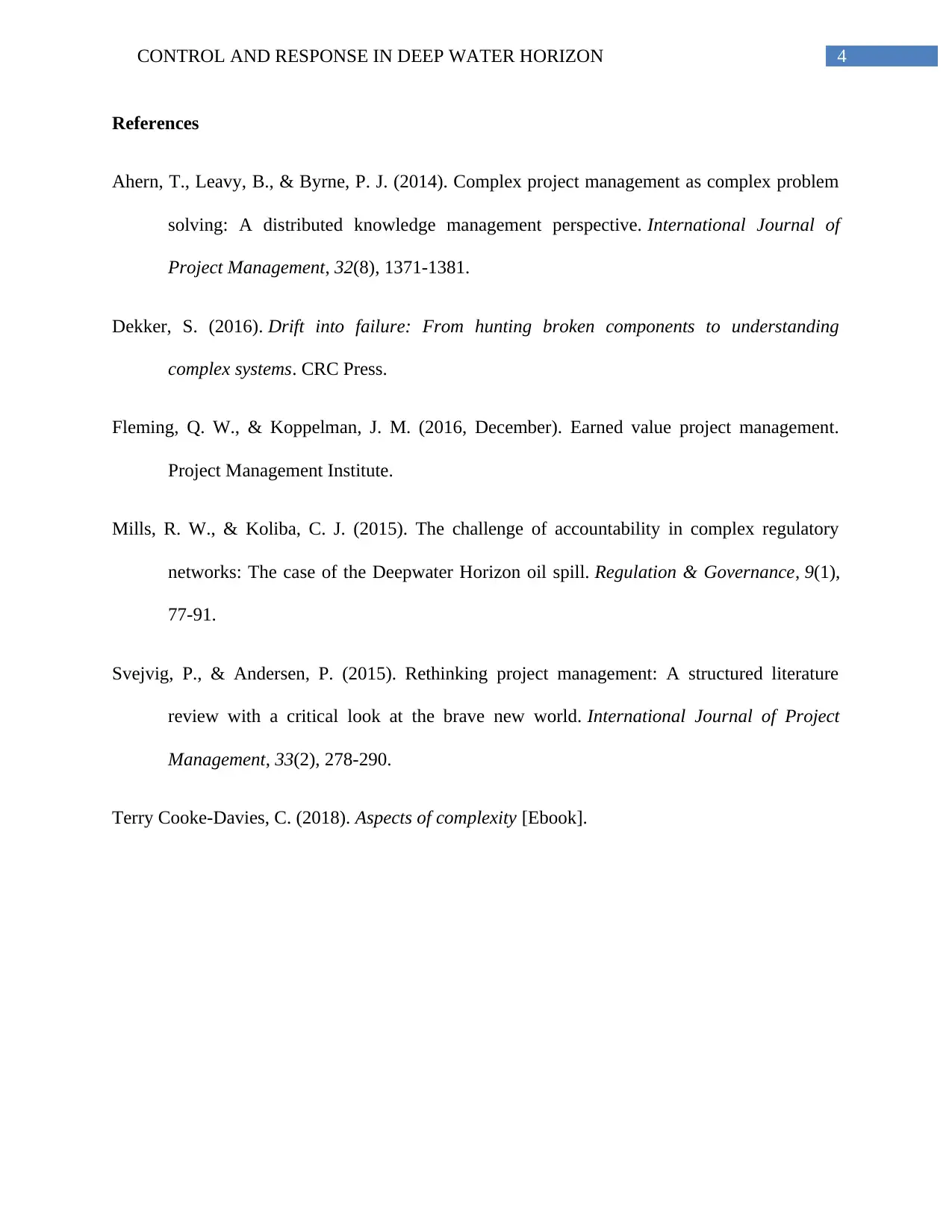
4CONTROL AND RESPONSE IN DEEP WATER HORIZON
References
Ahern, T., Leavy, B., & Byrne, P. J. (2014). Complex project management as complex problem
solving: A distributed knowledge management perspective. International Journal of
Project Management, 32(8), 1371-1381.
Dekker, S. (2016). Drift into failure: From hunting broken components to understanding
complex systems. CRC Press.
Fleming, Q. W., & Koppelman, J. M. (2016, December). Earned value project management.
Project Management Institute.
Mills, R. W., & Koliba, C. J. (2015). The challenge of accountability in complex regulatory
networks: The case of the Deepwater Horizon oil spill. Regulation & Governance, 9(1),
77-91.
Svejvig, P., & Andersen, P. (2015). Rethinking project management: A structured literature
review with a critical look at the brave new world. International Journal of Project
Management, 33(2), 278-290.
Terry Cooke-Davies, C. (2018). Aspects of complexity [Ebook].
References
Ahern, T., Leavy, B., & Byrne, P. J. (2014). Complex project management as complex problem
solving: A distributed knowledge management perspective. International Journal of
Project Management, 32(8), 1371-1381.
Dekker, S. (2016). Drift into failure: From hunting broken components to understanding
complex systems. CRC Press.
Fleming, Q. W., & Koppelman, J. M. (2016, December). Earned value project management.
Project Management Institute.
Mills, R. W., & Koliba, C. J. (2015). The challenge of accountability in complex regulatory
networks: The case of the Deepwater Horizon oil spill. Regulation & Governance, 9(1),
77-91.
Svejvig, P., & Andersen, P. (2015). Rethinking project management: A structured literature
review with a critical look at the brave new world. International Journal of Project
Management, 33(2), 278-290.
Terry Cooke-Davies, C. (2018). Aspects of complexity [Ebook].
1 out of 5
Related Documents
Your All-in-One AI-Powered Toolkit for Academic Success.
+13062052269
info@desklib.com
Available 24*7 on WhatsApp / Email
![[object Object]](/_next/static/media/star-bottom.7253800d.svg)
Unlock your academic potential
Copyright © 2020–2026 A2Z Services. All Rights Reserved. Developed and managed by ZUCOL.



